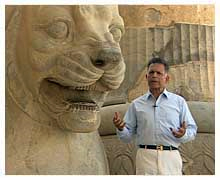
A. Shapur Shahbazi (1942-2006)
The late professor, Ali Reza Shapur Shahbazi was born in Shiraz, Iran. In 1960, as Iran’s highest-ranking geography student, he was awarded an academic scholarship at the University of London, where he earned a Master’s degree and doctorate in archeology. He later completed his post-doctorate in Iranian historiography from Georg August University in Goettingen, Germany. Dr. Shahbazi founded the Institute of Achemenid Research at Persepolis, Persia’s ancient ceremonial capital, and served as its director from 1973 until the Islamic Revolution of 1979. As one of Iran’s most prominent intellectuals, he lived in exile in Germany and the United States after the upheaval of the revolution. It brought him great pride and joy to eventually reopen the Institute and resume his scholarly and professional career in Iran, in which he remained very active until his death. Dr. Shahbazi taught at the universities of Shiraz, Tehran, Goettingen, Harvard, Columbia and Eastern Oregon, and was one of the world’s foremost authorities in several areas of pre-Islamic Iranian history, language and culture. He is the author of 16 books and 180 articles and publications, and received numerous international honors for his scholarly contributions. He won the national Book of the Year Award for his first major work, a biography of Cyrus the Great, when he was still in his 20’s. Most recently, he was the first recipient of the North American Middle East Studies Association Houshang Pourshariati Award in Iranian Studies, “for his role as one of the few Iranians who have single-handedly rewritten Iranian history.” He was admired and loved by his students, and he received EOU’s Distinguished Teaching Faculty Award in 2005. He shed light on many complex historical questions, including the dates of Persia’s epic poet Ferdowsi, and of Zoroaster, the founder of the world’s first monotheistic religion. He was cherished by the Zoroastrian community throughout the world for his contributions and dedication to the study of their religion. He was also an esteemed writer and editor for Encyclopedia Iranica for three decades. His historical studies and discoveries ranged from the fourth century BC to the 10th century CE. However, his knowledge was not limited to Iran and the Middle East. He was an expert in history, archeology, geography, religion, art, politics and literature. Dr. Shahbazi was tireless in sharing his knowledge and helping the world understand different angles and perspectives of history, culture and current events. He was highly respected by the international community in numerous fields, and was sought out and consulted regularly by scholars, as well as such organizations as the United Nations, UNESCO, National Geographic, BBC and the Discovery Channel. He gave selflessly and devoted all his energies to the three greatest loves of his life—his family, his country and his scholarly work.